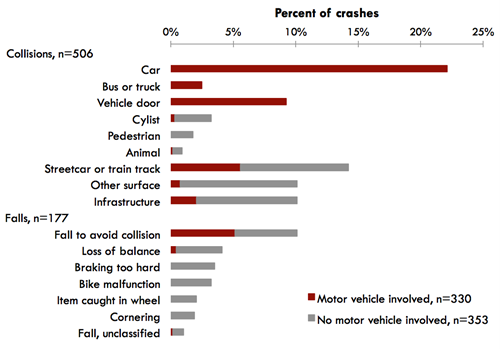
Injury Circumstances and Severity
Data from interviews with 683 participants of the Bicyclists’ injuries & the cycling environment (BICE) study was used to classify injury crash circumstances.
Most crashes (74%) were collisions. Collisions included those with motor vehicles, streetcar or train tracks, other surface features, infrastructure, and pedestrians, cyclists, or animals. Although direct collisions with motor vehicles represented about 1/3 of the crashes, many additional crashes occurred because the cyclist was attempting to avoid a motor vehicle, so the total proportion that involved motor vehicles was about 1/2.

Crash circumstances were distributed differently by route type, for example
- collisions with motor vehicles, including “doorings”, were overrepresented on major streets with parked cars
- collisions involving streetcar tracks were overrepresented on major streets
- collisions involving infrastructure (curbs, posts, bollards, street furniture) were overrepresented on multi-use paths and bike paths
Injury severity
Data from the BICE study was also used to determine what factors were related to the severity of the bicycling injuries of the 690 study participants. Injury severity was classified using the following 4 metrics:
- able to continue trip by bike or not
- transported to hospital by ambulance or not
- admitted to hospital or not
- treatment urgency as assessed by Emergency Department personnel (“CTAS”, where 1 = most urgent and 5 = least)
The following factors were consistently associated with increased severity:
- older age
- collision with a motor vehicle
- bicycling on downhill grades
- routes with higher motor vehicle speeds
- cycling on sidewalks, multi-use paths or local streets
Collisions with motor vehicles and higher motor vehicle speeds have been found to be related to injury severity in many other studies. When taken together with the main BICE study results, these results show that facilities that separate cyclists from motor vehicle traffic and pedestrians, minimise slopes, and lower motor vehicle speeds would reduce both the risk of being in a crash and injury severity after a crash.
KNOWLEDGE PRODUCTS
- Teschke K, Frendo T, Shen H, Harris MA, Reynolds CCO, Cripton PA, Brubacher JR, Cke K, Frendo T, Shen H, Harris MA, Reynolds CCO, Cripton PA, Brubacher JR, Cusimano MD, Friedman SM, Hunte G, Monro M, Vernich L, Babul S, Chipman M, Winters M. (2014). Bicycling crash circumstances vary by route type: a cross-sectional analysis. BMC Public Health ;14:1205 [article]
- Cripton PA, Shen H, Brubacher JR, Chipman M, Friedman SM, Harris MA, Winters M, Reynolds CCO, Cusimano MD, Babul S, Teschke K. (2015). Severity of urban cycling injuries and the relationship with personal, trip, route and crash characteristics: Analyses using four severity metrics. BMJ Open ;5: e006654 [article]
- Teschke K, Jessica Dennis J, Reynolds CCO, Winters M, Harris MA. (2016). Bicycling crashes on streetcar (tram) or train tracks: mixed methods to identify prevention measures. BMC Public Health;16:617 [article]
- Cycling crashes on streetcar or train tracks [poster]
- Injuries at traffic circles CARSP 2018 Proceedings [paper]

